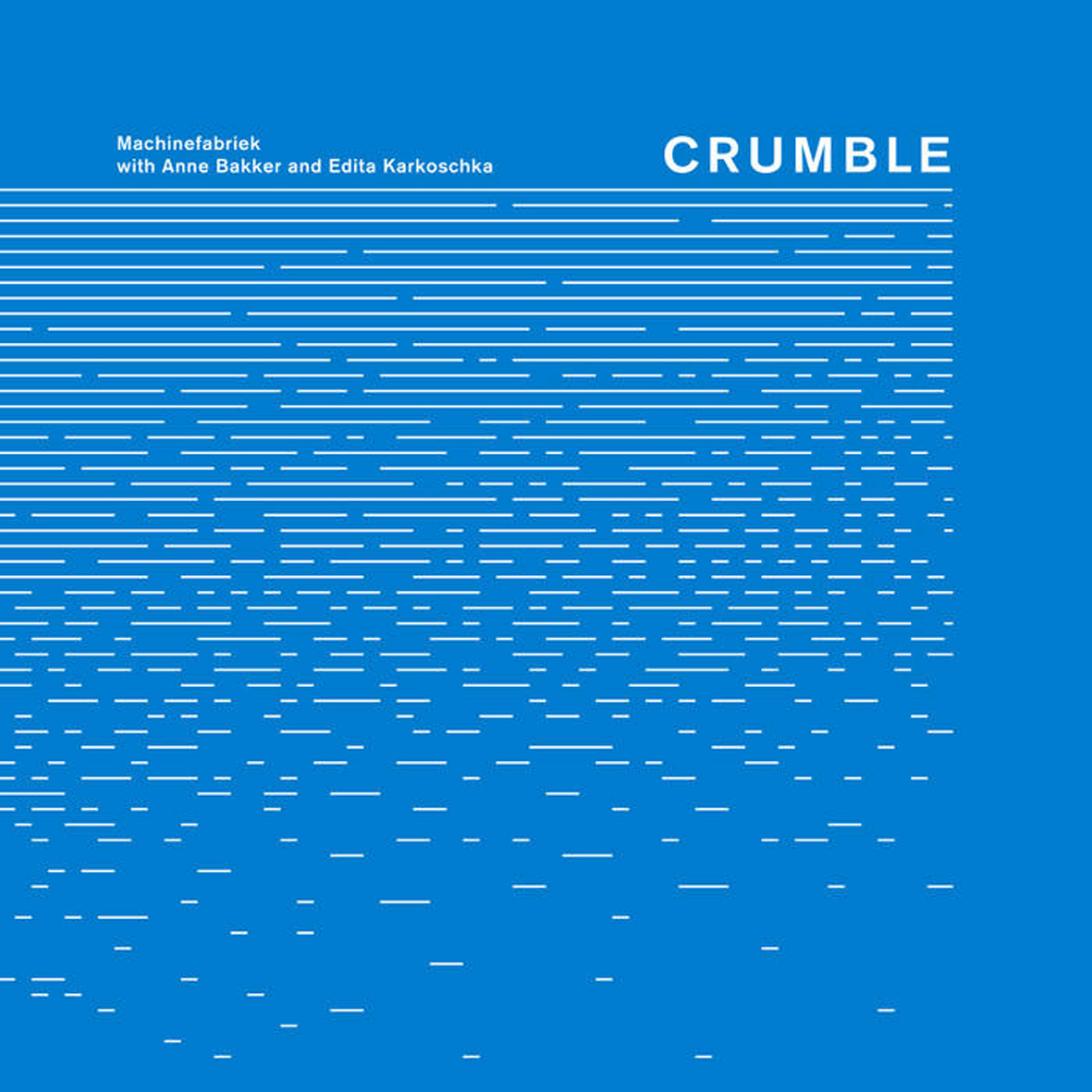
Late last year, Rutger Zuyderveldt teamed up with violinist Anne Bakker for the brilliantly tense, nerve-jangling, and unique Deining EP.  Naturally, when I learned that Bakker had returned to the Machinefabriek fold for an even longer work, I had to hear it.  As it turns out, however, Crumble is absolutely nothing like its predecessor at all.  Part of that is certainly due to the additional presence of vocalist Edita Karkoschka, but (as with Deining) it is ultimately Zuyderveldt that pieces everything together in service of his vision.  That vision, in this case, is quite a bizarre one, quixotically cramming gorgeous neo-classicism, sultry vocals, spiritual-sounding reveries, and a whole lot of harsh noise into a single longform piece.  As a whole, it seems a bit maniacally over-ambitious and fragmented to me, but it definitely contains a handful of wonderful moments.
The opening of Crumble easily stands as one of the most baffling and wrong-footing introductions to an album that I have yet encountered.  For the first few minutes, a wonderfully fragile and lilting violin motif unfolds over a warm beautiful bed of flute-like drones.  Gradually, a dreamily cooing loop of Karkoschka's vocals fades in along with a rising tide of static and Crumble seems like it is on course to potentially be the single most beautiful piece in Machinefabriek's massive discography.  Unfortunately, the static continues to relentlessly swell and everything else soon disappears.  For the next several minutes, the piece is literally nothing but a static blizzard of white noise.  For a moment, I suspected that either my stereo had broken or that some problem had occurred when downloading the mp3, but there is just enough hint of form within the squall to convey that it is an entirely deliberate choice (rhythmic crackling, industrial buzzing, and snatches of distant field recordings).  Stranger still is the fact that the white noise begins to escalate in intensity and additionally throws in some howling wind noises, taking Crumble perilously close to Merzbow territory.  It seems like that phase of the piece goes on forever, but it is actually just five or six minutes (still more than enough to shake most casual listeners, I suspect).  For those of us still hanging around at the 11-minute mark, however, the roaring maelstrom abruptly subsides and a very different piece of music begins in earnest.
For the most part, Crumble's second half is a showcase for Karkoschka's singing, though it is often enigmatically cut up and looped.  It is the tone of the piece that is most mysterious, however, as it begins sounding like a rather languorous and pretty spiritual or traditional piece, as Karkoschka soulfully coos over a minimal backdrop of electronic drones and understated blossoms of violin.  As with the rest of Crumble, however, the bottom simply drops out at a certain point and I am dropped into a new motif that sounds like some kind of sexy avant-garde take on the blues: Karkoschka moans and twists her way around the phrase "never find me" while Zuyderveldt maintains an ominous throb and a wonderfully shifting rhythm of electronic pops, crackles, and sizzles.  Naturally, that quickly dissolves (or crumbles) into a neo-classical interlude of churning violins and the piece basically becomes a constantly shifting hall of mirrors where strange new motifs keep appearing and I never have any idea what any of it means or why it is happening.  Crumble is a lot like a deeply conceptual prog rock epic in many ways (it even briefly sounds like one at one point), as it has a complex structure and arc that I cannot wrap my head around and gives the illusion of saying something very profound and important.  Unfortunately, I do not think that there is any great riddle to solve or any bold vision lurking within Crumble's lyrics or compositional arc.  I would not necessarily describe it as "smoke and mirrors,' but it definitely feels an abstract collage of evocative, stand-alone vignettes that is optimistically presented as an arc.  Or possibly a concept album that was deconstructed and recontextualized to strip away all of its original meaning.
Needless to say, Crumble is very much a flawed album in some very significant and fundamental ways.  The most immediately obvious one is Zuyderveldt's decision to quickly cast aside the heavenly opening motif for a prolonged wall of noise, which may have made somewhat more sense to me if that theme had reappeared later.  It does not.  As far as I can tell, nothing important ever makes more than one appearance, which is one of Crumble's many perplexing shortcomings as a composition.  If I can accept that it is just an experimental and kaleidoscopic fantasia, however, Crumble can be appreciated as an inspired and fitfully wonderful departure from Machinefabriek's comfort zone.  Even if it does not hold together, Crumble fires off one interesting idea after another once it gets rolling.  Also, there are number of truly great "set pieces" strewn throughout the piece that easily could have been the basis for shorter (and superior) stand-alone works (the opening violin theme, the dubwise rhythm of clicks and pops, and the very menacing sounding swoops that appear during the crescendo). I just wish I could know what Zuyderveldt was thinking when he decided to give Crumble the shape he did, as the foundation for a great album is definitely here, but it seems like everything was willfully taken in a very counterintuitive and contrary direction.  Ultimately, I have to reluctantly damn Crumble with the faint praise of "an interesting effort," but Zuydervelt at least deserves some admiration for conjuring up such a radical detour this deep into his career.
 
Read More

